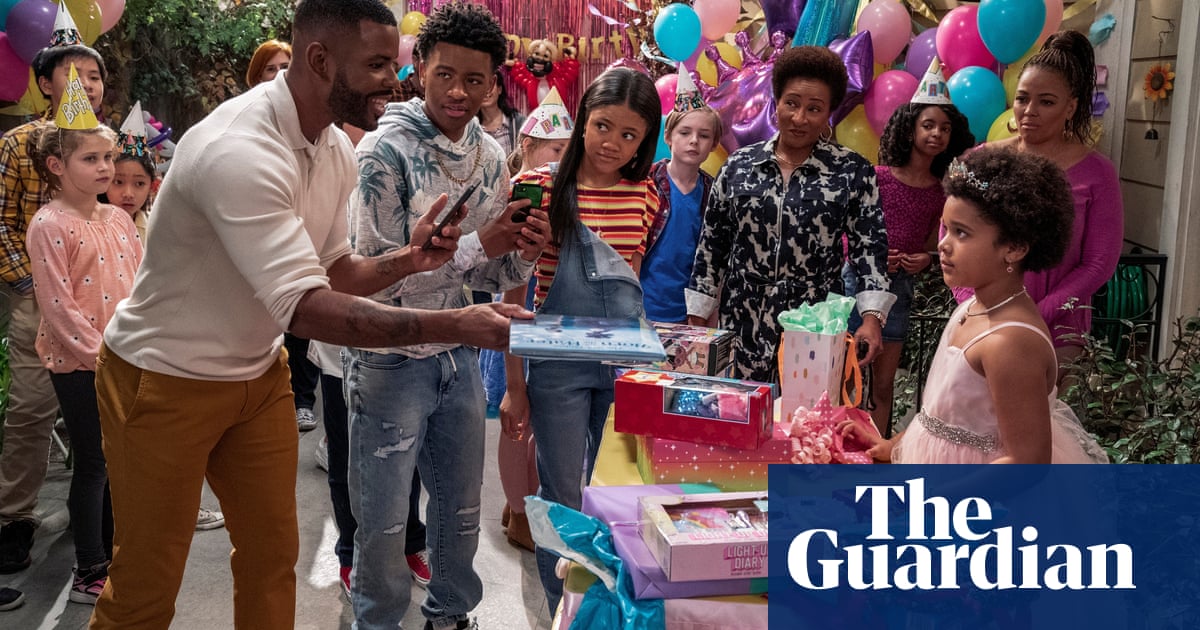
How Netflix’s The Upshaws shows that the family sitcom is still thriving
The second season of The Upshaws picks up where the previous season left off – with a small girl dropping in on the family claiming to be a long-lost daughter.
For Bennie Upshaw, it’s the latest in a series of devastating revelations that threaten to undo a fragile family that’s already struggling to integrate an estranged adult son and a teenage boy conceived out of wedlock. Where a soap opera or pulpy drama might approach these plot twists soberly, The Upshaws play it for laughs. When Bennie finds out his older son is the little girl’s father, he indulges in an I-told-you-so moment before his convoluted reality sets in again. “Wait a minute,” he says to his adult son. “I thought you were gay?” (He is.)
The pioneering Tonight Show host Steve Allen once described comedy as “tragedy plus time”. But the Upshaws is more like an exercise in subtraction, narrowing the gap between tragedy and time enough to leave audiences questioning the genre they’re watching. Lately, it seems only single-camera comedies have been able to get away with this sleight of hand. But The Upshaws is showing that multi-cam sitcoms can make light of difficult subjects, too. And its place on Netflix is no small feat.
For years Netflix has been on a mission to find a niche in Black sitcoms. During the pandemic it acquired Moesha, Girlfriends, One on One and four more series. But their results creating similar programming have been mixed. All About the Washingtons, which starred Joseph Simmons (the Run in Run-DMC) and his wife Justine, played like a bad version of their long-ago MTV reality show. Dad Stop Embarrassing Me! was a concept Jamie Foxx hatched with his daughter during the pandemic, and was arguably the Oscar-winner’s biggest flop since 2018’s Robin Hood. Only Family Reunion endures with a lively core cast that includes Loretta Devine, Tia Mowry-Hardrict and Shaft himself, Richard Roundtree. Earlier this year Netflix announced plans to renew the series for a fifth and final season.
But where Family Reunion sticks to obvious wackiness (ex-American footballer moves his family of six back in with his parents), The Upshaws follows in the far more provocative tradition of modern Norman Lear-style sitcoms like The Carmichael Show (which found easy conflict in nuanced family debates about birth control and school shootings) and Marlon (about a newly porced dad’s misadventures in co-parenting). Created by the comedian Wanda Sykes and ace comedy writer Regina Y Hicks, The Upshaws is a working-class treatise that serves family drama another sitcom might sweep under the rug: the cheating spouses, the outside kids, the child-rearing regrets – the constant efforts to do better only to have life kick you in the ass again. After premiering last May, The Upshaws zoomed to the second spot on Netflix’s most-watched list. The Season two drop on 29 June put the show back in the streamer’s top 10.
Seven years after ABC canceled his Uncle Buck reboot after a single season, Mike Epps finally gets a long runway to flaunt his comedy and dramatic chops as fast-talking Bennie. Sykes is witheringly deadpan as Lucretia, the sister-in-law who was always wary of Bennie. Gabrielle Dennis, of A Black Lady Sketch Show fame, crackles as Bennie’s baby mother Tasha.
But the heart of the series, and the Upshaw family, is Regina – the beleaguered matriarch. And one would be hard pressed to name a better-suited actor for the role than Kim Fields – the sitcom doyenne who broke out as Tootie on The Facts of Life, stole hearts as Regine on Living Single and even had a thwarted hero arc on the eighth season of the Real Housewives of Atlanta.
As Regina, Fields makes a game of how easily she can shift from silly to sultry to seething and back again – all the while illustrating why a woman of Regina’s vibrance and ambition would put up with a man as untrustworthy as Bennie, her main squeeze since high school. But Epps’s Bennie, too, has the best intentions of being a provider to his family – no matter how complicated it grows. It’s just that, well, he’s only human. And he has an unfailing weakness for pleasures of the flesh.

But it isn’t just the performers that give The Upshaws its edge. Because it’s on Netflix, it isn’t beholden to the standards of conventional sitcoms. Mom and Dad swear, Lucretia can’t stop dropping the N-word and the Upshaws’ teenage daughter Aaliyah (Khali Daniya-Renee Spraggins) refers to her high school crush turned half-brother as her “ghetto twin”. Worse, the laughs are canned – a consequence of taping during Covid-ban. It’s the stuff of Cliff Huxtable’s worst nightmares. But that’s exactly the point.
In the four decades since Lear’s Good Times signed off, Black sitcom families have taken pains to showcase Black prosperity; we’ve gone from George Jefferson owning a thriving dry cleaning business to the Huxtables being seven-figure white-collar earners to the Johnson clan swanning around their well-heeled LA cloister in urban couture. Apart from the odd emotional setbacks, their lives progress on an upward curve, and it’s the patriarch who keeps everyone on the straight and narrow. Meanwhile, The Upshaws scrape by, suffer hard losses and live under constant threat of Bennie’s backsliding blowing up their fragile peace. It’s as a real as a TV show gets. That it laughs at itself too just goes to show the multi-cam sitcom still has serious range.














